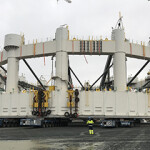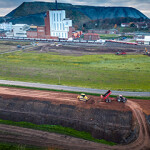Ava Ocean pioneering precision scallop-harvesting technology

Ålesund, Norway-based ocean tech company Ava Ocean has pioneered a new method of seabed shellfish harvesting and is about to start a five-year commercial test fishery to prove the concept.
The company has worked with marine scientists to develop a precise method to pick Arctic scallops (Chlamys islandica) and other seafood from the seabed without taking bycatch or harming the surrounding environment. As a result, Ava Ocean has been awarded the first commercial quota for Arctic scallops in Norway since the 1990s. The test fishery will document and report all catch data, and closely monitor the stock and the impact of fishing activity.
“To us, the bottom of the ocean is the most exciting place on earth. A place full of seafood treasures, that if harvested in a gentle yet effective manner, can be a positive contributor to economic, societal, and environmental sustainability,” Ava Ocean CEO Øystein Tvedt said.
Ava Ocean’s game-changing technology uses optical sorting to enable the identification, selection, and sorting of bottom-dwelling species, which are gently drawn into large baskets using a precision water-flow pump. These hover over the seabed, suspended from wings located on either side of the vessel. Once full, the baskets are raised onboard.
“Artificial intelligence technology enables us to identify exactly where the scallops are, and their numbers before and after harvest, all of which will be recorded as part of the project,” Zimowski said.
The company’s aim is to revolutionize seabed harvesting and to lead the way towards a sustainable future for benthic shellfisheries, according to Ava Ocean Chief Marketing and Communications Officer Anette Grøttland Zimowski.
“Until now, human interaction with the seabed has been largely destructive, with commonly used fishing methods such as dredging and bottom-trawling wreaking havoc on fragile benthic ecosystems,” Zimowski told SeafoodSource. “Our technology offers a real opportunity to positively disrupt the industry and change it for the better.”
Inspiration for the technology and the project came from the sub-sea oil and gas sector and the fishing and wider marine industries, and it is these backgrounds from which the company’s five founders originate.
“We knew there was a large population of scallops in the Barents Sea and that no one could fish them because dredging has been banned in Norway for nearly 30 years. This knowledge became a challenge, which was to find a way to access these valuable resources in a sustainable and non-harmful way,” Zimowski said.
Working in close collaboration with the Norwegian Institute of Marine Science and independent research organisation SINTEF, Ava Ocean was able to show that the Barents Sea scallop population had recovered from its collapse in the late 1980s and was ready to be harvested responsibly.
The five-year research quota allows the company to fish 15,000 metric tons (MT) of scallops per year. These will be de-shelled, processed, and frozen onboard its newly refitted 85-meter-long vessel, the Arctic Pearl, a former offshore supply ship. Ava Ocean has partnered with Hofseth International to market the scallops, and Zimowski is looking forward to working with them to tell the story to consumers.
“We have planned for full use of the scallops and will freeze all the waste products, including the frills and roes, which will be landed for use in animal feed. Shells will be returned to the seabed, as they act as a good substrate for the recruitment of new scallops, although we may look at developing some in-shell products in future,” she said.
Alongside the test scallop fishery, the company will also continue to develop and assess the technology for potential use with other species and in other geographic areas, working closely with regulators, science, industry, and NGOs along the way.
“There is a lot of talk about conservation and until now the only solution has been to stop dredging, but we believe that our new technology could enable people to access the resources again. Once proven, we hope to make it accessible to test worldwide, and end harmful seabed harvesting practices forever,” she said.
Zimowski said the new vessel is very large and the costs of undertaking the trial are considerable, but Ava Ocean is aware of the need for economic as well as biological sustainability if others are to take up the technology. As a result, it has been made to be scalable for use on smaller vessels and Zimowski said Ava Ocean has already received expressions of interest in the technology from several operators.
Photo courtesy of Ava Ocean






Share